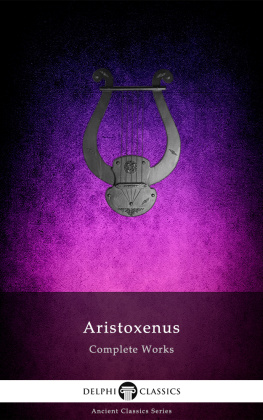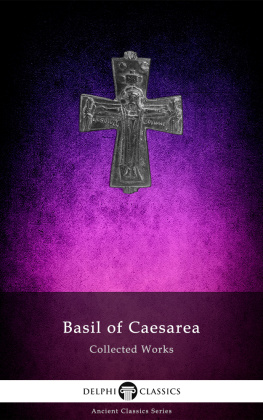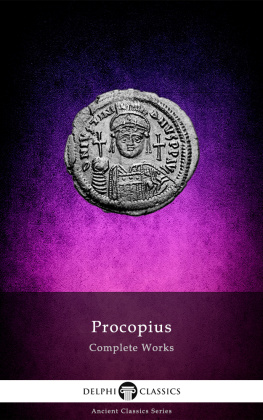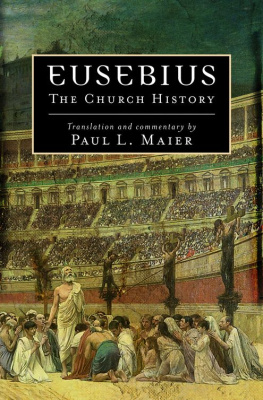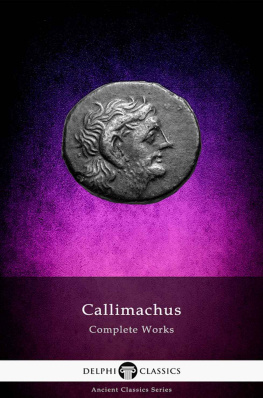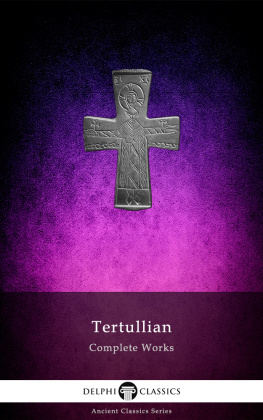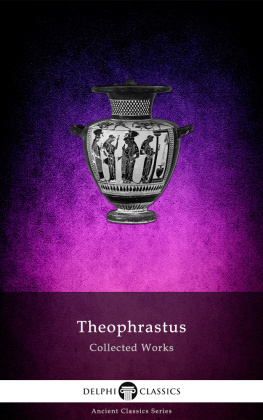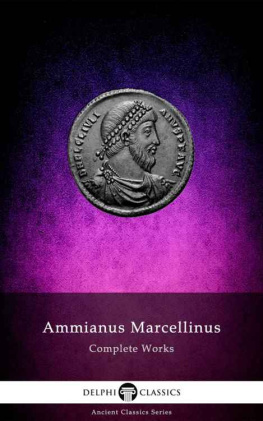
The Collected Works of
EUSEBIUS
(AD 260/265339/340)

Contents

Delphi Classics 2019
Version 1

Browse Ancient Classics







The Collected Works of
EUSEBIUS OF CAESAREA

By Delphi Classics, 2019
With special thanks to
Roger Pearse and the contributors to
http://www.tertullian.org/fathers/

The Translations

The ruins of Caesarea Maritima, an ancient city in the Sharon plain on the coast of the Mediterranean, now included in an Israeli national park assumed to be Eusebius birthplace

Remains of the ancient Roman aqueduct at Caesarea Maritima
Chronicle

Translated by Andrew Smith
In c. 290, Eusebius began work on his Chronicon , a universal calendar of events from the Creation until the vicennalia of Constantine I in A.D. 325. Composed of two books, the original Greek text is lost, although substantial quotations exist in later chronographers. Book I contained sets of extracts from earlier writers, detailing a summary of universal history from the sources, arranged according to nations. The second Book provides a technically innovative list of dates and events in tabular format the equivalent of a parallel timeline, where each line is a year. It is the longest preserved list of Olympic victors, providing the stadion (running race) winners from 776 B.C. to A.D. 217. Both books are mostly preserved in an Armenian translation and Book II is entirely preserved in the Latin translation by Jerome. Portions also exist in quotation in later Syriac writers such as the fragments by James of Edessa and, following him, Michael the Syrian.

Armenian translation of Chronicon, thirteenth century manuscript
CONTENTS
BOOK I. TRANSLATION FROM PETERMANNS MODERN LATIN TRANSLATION
[p1] I have searched through the various books of ancient history; [I have read] what the Chaldaeans and Assyrians have recorded, what the Egyptians have written in detail, and what the Greek have related as accurately as possible. They include the dates of their kings and the Olympiads, which are athletic contests, and they contain the outstanding exploits of both the Greeks and the barbarians, of both the brave and the decadent. They also mention the remarkable victories of these nations, their generals, scholars, heroes, poets, historians and philosophers.
I think it is fitting, or rather a useful and necessary task, to summarise all this, and to write down the ancient history and chronology of the Hebrews, taken from the Holy Scriptures, alongside the things which I have just mentioned. From that we can tell how long Moses, and the prophets who came after him, lived before the appearance on earth of our saviour, about which they prophesied through the holy spirit; and we can easily recognise in which [reigns] of Greek or barbarian [rulers] the famous men of each race were alive; and at what time, from the beginning, the outstanding prophets existed amongst the Hebrews, together with all their rulers, one after another.
I warn and advise everyone from the start, that no-one should ever pretend that he can be completely certain about matters of chronology. It will help if first we remember the advice of our true master, [p3] who told his companions [Acts, 17]: It is not for you to know the hours and seasons whicih the Father has set under his own authority. He, as our Lord and God, uttered this saying not only about the end of the world, but also, in my opinion, about all dates, to dissuade men from such pointless investigations.
Indeed, my own words here will confirm this saying of our master, [by showing] that it is not possible to gain an accurate knowledge of the whole chronology of the world from the Greeks, or from any others, not even from the Hebrews themselves. But it is possible to hope for this only: that what is said by us in this present treatise will help us to recognise two things. Firstly, no-one, like some have done, should believe that he is calculating dates with full accuracy, and be deceived in that way. But he should realise that this has been brought up for discussion, only so that he can know the means and manner of the proposed investigation, and so that he should not remain in doubt.
There is no reason to be surprised that the Greeks do not appear in the most ancient times. They have fallen into various fatal errors, and for a long time before the generation of Cadmus they were completely ignorant of writing. They say that Cadmus was the first to bring them the alphabet, from the land of the Phoenicians. And so the Egyptian in Platos book [ Timaeus, 22B ] rightly despises Solon; O Solon, he says, you Greeks are always children. An old Greek man is never to be found, and no-one can learn from you about ancient times. But many improbable stories have been told by the Egyptians and Chaldaeans. For instance, the Chaldaeans calculate that their recorded history has lasted for more than 400,000 years. [p5] The Egyptians make up myths about gods and demi-gods, and also about some shades; and they tell many crazy myths about other mortal kings.
Yet what forces me to examine such matters in detail now, when I value the truth above all else? Even amongst my beloved Hebrews one can find inconsistencies, which I will mention at the appropriate time. But I have said this much in reproach of those chroniclers who are eager for such hollow glory.
Next page

